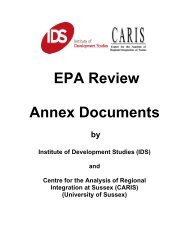The Impact of Energy Use on Poor Urban Livelihoods in ... - DfID
The Impact of Energy Use on Poor Urban Livelihoods in ... - DfID
The Impact of Energy Use on Poor Urban Livelihoods in ... - DfID
You also want an ePaper? Increase the reach of your titles
YUMPU automatically turns print PDFs into web optimized ePapers that Google loves.
A Study <str<strong>on</strong>g>of</str<strong>on</strong>g> the <str<strong>on</strong>g>Impact</str<strong>on</strong>g> <str<strong>on</strong>g>of</str<strong>on</strong>g> <str<strong>on</strong>g>Energy</str<strong>on</strong>g> <strong>on</strong> <strong>Poor</strong> <strong>Urban</strong> <strong>Livelihoods</strong> <strong>in</strong> Arusha, Tanzania<br />
Restaurants and guest houses are all significant users <str<strong>on</strong>g>of</str<strong>on</strong>g> woodfuel. In additi<strong>on</strong><br />
Arusha’s textile <strong>in</strong>dustry and brewery have also reverted to us<strong>in</strong>g woodfuel because<br />
<str<strong>on</strong>g>of</str<strong>on</strong>g> high electricity costs. Because <str<strong>on</strong>g>of</str<strong>on</strong>g> the size <str<strong>on</strong>g>of</str<strong>on</strong>g> their demand, this further reduces the<br />
availability and hence raises the cost <str<strong>on</strong>g>of</str<strong>on</strong>g> this energy source for domestic c<strong>on</strong>sumers 62 .<br />
Data <strong>on</strong> energy use <strong>in</strong> Arusha taken from the HBS shows that most households <strong>in</strong><br />
Arusha currently use firewood and charcoal <strong>in</strong> preference to electricity and gas. Very<br />
few use electricity for cook<strong>in</strong>g. A detailed breakdown <str<strong>on</strong>g>of</str<strong>on</strong>g> energy used for cook<strong>in</strong>g and<br />
light<strong>in</strong>g is given <strong>in</strong> table 3.6? Figure 3.9?.<br />
Figure C.11: Comparis<strong>on</strong> between Tanzania urban areas and Arusha<br />
Proporti<strong>on</strong>al use by type <str<strong>on</strong>g>of</str<strong>on</strong>g> energy <strong>in</strong> domestic energy sector<br />
2000/01<br />
Cook<strong>in</strong>g Light<strong>in</strong>g<br />
Tanzania<br />
urban areas a<br />
Arusha Tanzania<br />
urban areas a<br />
Arusha<br />
Firewood 33.8 75<br />
Charcoal 53.3 10<br />
Kerosene 8.9 11 28.6 42<br />
ELectricty 69.6 57<br />
a –<br />
Exclud<strong>in</strong>g Dar es Salaam<br />
Source HBS 2000/1<br />
C.7 Gender<br />
C.7.1 <str<strong>on</strong>g>The</str<strong>on</strong>g> cultural paradigm<br />
<str<strong>on</strong>g>The</str<strong>on</strong>g> cultural paradigm still c<strong>on</strong>siders women, despite evidence <str<strong>on</strong>g>of</str<strong>on</strong>g> chang<strong>in</strong>g male and<br />
female ec<strong>on</strong>omic roles and resp<strong>on</strong>sibilities (discussed below), as subservient to men.<br />
Men are still expected to be the bread w<strong>in</strong>ner and women to be married and perform<br />
all the reproductive work <strong>in</strong>clud<strong>in</strong>g care for children, the old, sick and disabled. <str<strong>on</strong>g>The</str<strong>on</strong>g>se<br />
resp<strong>on</strong>sibilities are rarely supported by improved technology.<br />
<str<strong>on</strong>g>The</str<strong>on</strong>g> customs <str<strong>on</strong>g>of</str<strong>on</strong>g> most ethnic groups oppose women hav<strong>in</strong>g either <strong>in</strong>heritance or<br />
ownership rights over land or other immovable property. This lack <str<strong>on</strong>g>of</str<strong>on</strong>g> ownership <str<strong>on</strong>g>of</str<strong>on</strong>g><br />
collateral has implicati<strong>on</strong>s for their ability to secure credit. (Omari and Koda)<br />
Boys are comm<strong>on</strong>ly preferred over girls. This social preference for boys by family,<br />
community and the legal system gives them more opti<strong>on</strong>s to succeed than girls. Girls<br />
are nurtured to become women who are n<strong>on</strong>-argumentative, n<strong>on</strong> assertive and quick<br />
to accept defeat and subord<strong>in</strong>ati<strong>on</strong>. In school, they (girls) are <str<strong>on</strong>g>of</str<strong>on</strong>g>ten assigned<br />
domestic activities, such as fetch<strong>in</strong>g water for teachers and cook<strong>in</strong>g for the bachelors,<br />
limit<strong>in</strong>g their time for study. Boys are given more time after school for sports, while<br />
girls are usually assigned household chores. (Mz<strong>in</strong>ga:)<br />
C.7.2 Household structure<br />
<str<strong>on</strong>g>The</str<strong>on</strong>g> household 63 structure varies c<strong>on</strong>siderably between urban and rural areas. <str<strong>on</strong>g>The</str<strong>on</strong>g><br />
nuclear ec<strong>on</strong>omic family compris<strong>in</strong>g a married couple with children is more comm<strong>on</strong><br />
<strong>in</strong> urban areas than the large extended families that predom<strong>in</strong>ant <strong>in</strong> rural areas.<br />
Although as shown <strong>in</strong> this study such extended families are still relatively comm<strong>on</strong> <strong>in</strong><br />
some poor urban areas. <str<strong>on</strong>g>The</str<strong>on</strong>g>re is a grow<strong>in</strong>g tendency for married man to have<br />
c<strong>on</strong>cub<strong>in</strong>es and even children outside marriage. Bitter and <str<strong>on</strong>g>of</str<strong>on</strong>g>ten life l<strong>on</strong>g hatred<br />
62 Key Informant Interview, Regi<strong>on</strong>al Forestry Officer<br />
63 Household both a socio-ec<strong>on</strong>omic and political unit compris<strong>in</strong>g members <str<strong>on</strong>g>of</str<strong>on</strong>g> different sex,<br />
ages, educati<strong>on</strong>al and political status.<br />
Development Plann<strong>in</strong>g Unit, UCL L<strong>on</strong>d<strong>on</strong><br />
Dr. Sheilah Meikle and Patrice North
















